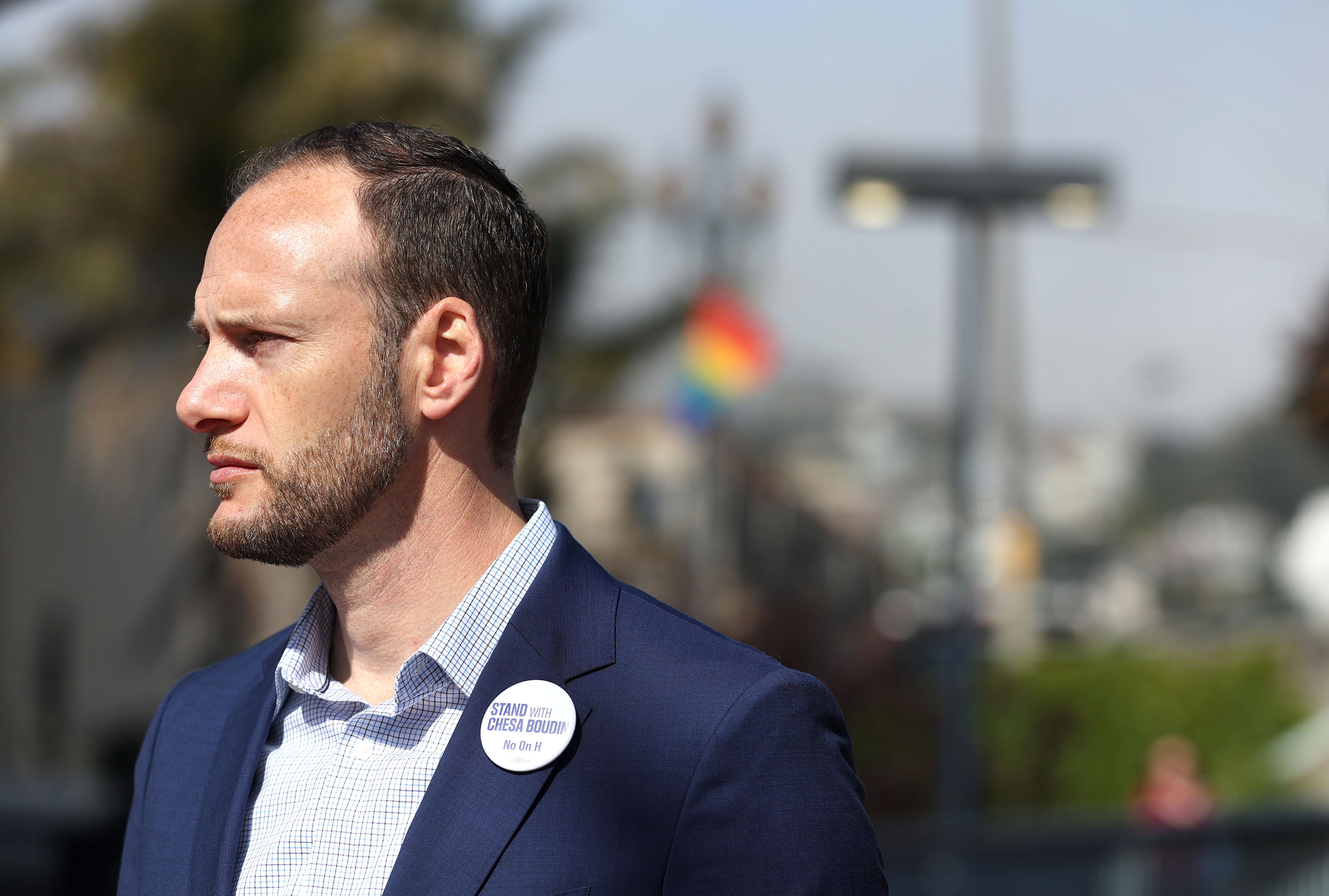
This article is part of The D.C. Brief, TIME’s politics newsletter. Sign up here to get stories like this sent to your inbox.
Chesa Boudin came to power at age 39 as something of a rock star, a progressive district attorney in San Francisco who made good on promises to eliminate cash bail, ease up on petty crimes, and reduce the number of inmates at jails and prisons. He prosecuted an on-duty police officer for manslaughter, a first for the city. He created an office to reopen suspected wrongful convictions, explored alternative sentencing arrangements, and called out policing he saw as racist. Zero cases prosecuted by the San Francisco DA’s office remain on California’s death row. Minors are being tried as juveniles, not adults. Boudin’s efforts at change are actually working.
Put another way: For progressives intent on overhauling the criminal-justice system, Boudin appeared perfectly cast as the lawyer to lead the charge, and San Francisco—at least from afar—seemed like a sufficiently liberal place to test many of their pet policies.
Yet, on Tuesday, voters in San Francisco were deciding whether to boot Boudin, now aged 41, a year-and-a-half before his term as the city’s top prosecutor ends. It’s not that crime is particularly up in San Francisco, and it’s not as though prosecutors dictate the behavior of would-be criminals, either. Reports of violent crime are actually down in San Francisco, and the city’s crime rates are comparable or lower than that of other cities.
The problem facing Boudin is this: residents of San Francisco feel less safe by a 2-to-1 margin, and such strong, personal feelings beat facts in politics. There’s a reason the order part of law-and-order campaign messaging works so well.
Boudin’s potential demise has been the stuff of conservative dreams since he first won election in 2019. The son of two convicted members of the violent Weather Underground, he was raised by two of the group’s founders while his parents served prison time. Boudin had grown into a Yale- and Oxford-educated public defender when he decided to pursue the top gig in the prosecutor’s office. Although he had never prosecuted a case in his life and had a rocky relationship with the establishment wing of the Democratic Party and an often hostile one with the police union, Boudin won on his first try for public office.
The politics he faced during his early days in the job back in 2020 are not those he faces today, however. In the intervening years, America has faced a reckoning with racism of all stripes, especially when it comes to injustice for Asian-American and Black residents. The Covid-19 lockdowns and isolation changed societal patterns in ways the country still hasn’t fully recognized. A substance abuse epidemic is flooding health care systems and courts alike. And the Great Resignation remade vast pieces of the economy. Take all of that and concentrate it into San Francisco, a city viewed by much of the country as a playground for the progressive fringe despite its metro area rivaling Boston or Detroit in size. San Francisco recently faced some of the worst anti-Asian-American violence in the country, while twice as many people died there from drug overdoses than Covid-19 during Boudin’s first year on the job. Roughly half of Boudin’s staff have either quit, retired, or been fired.
That environment, coupled with Boudin’s perceived leniency for so-called victimless crimes like shoplifting, left plenty in the Bay Area frustrated. An early recall effort against Boudin came up short, but a second attempt secured enough signatures to put the question to voters. Efforts to boot Boudin raised roughly $7 million, and his friends are being outspent by a 2-to-1 margin. He can blame big GOP donors and misinformation campaigns, but none of that completely explains why polling and early-voting trends suggest a majority of voters don’t want him to complete his term.
The spasm tensing in San Francisco could be an early flare for criminal-justice focused policymakers from both parties. Boudin is a charismatic figure, but he fits in a broader movement of prosecutors elected on pledges to revamp the system. Not all of them are the bleeding-heart liberals critics make them out to be. While Fox News targets the DAs of New York City, Chicago, Philadelphia, Boston, St. Louis, and Los Angeles, conservatives, too, have made strides in the same policy space. Places like Greenwood, Miss., Pima County, Ariz., and York County, Pa., may seem like unlikely places for similar efforts to have taken hold, but they have. The unknown is whether policy leaders in these communities, red and blue alike, will stick with their current efforts, or recoil in fear of what the next election could bring.
Still, there is no denying the current electoral realities are tough. Sure, Philadelphia’s prosecutor weathered his own primary last year despite unrelenting accusations he had gone soft on crime. But the district attorney for Los Angeles will face his own challenge if his opponents can secure enough signatures by next month to force a recall for a litany of reform efforts that sound curiously like what has been unfolding in the Bay Area.
And, of course, some of the Republican Party’s sharpest operatives are watching closely to see what San Francisco voters do on Tuesday, and will try to replicate the strategy elsewhere if it is successful.
Make sense of what matters in Washington. Sign up for the D.C. Brief newsletter.
More Must-Reads from TIME
- Donald Trump Is TIME's 2024 Person of the Year
- Why We Chose Trump as Person of the Year
- Is Intermittent Fasting Good or Bad for You?
- The 100 Must-Read Books of 2024
- The 20 Best Christmas TV Episodes
- Column: If Optimism Feels Ridiculous Now, Try Hope
- The Future of Climate Action Is Trade Policy
- Merle Bombardieri Is Helping People Make the Baby Decision
Write to Philip Elliott at philip.elliott@time.com